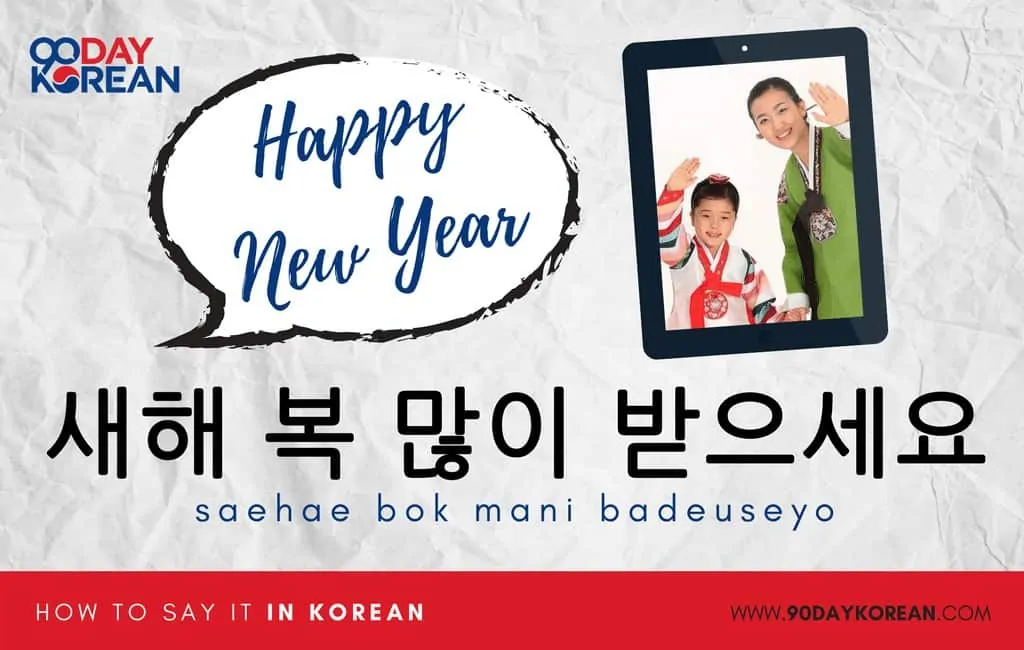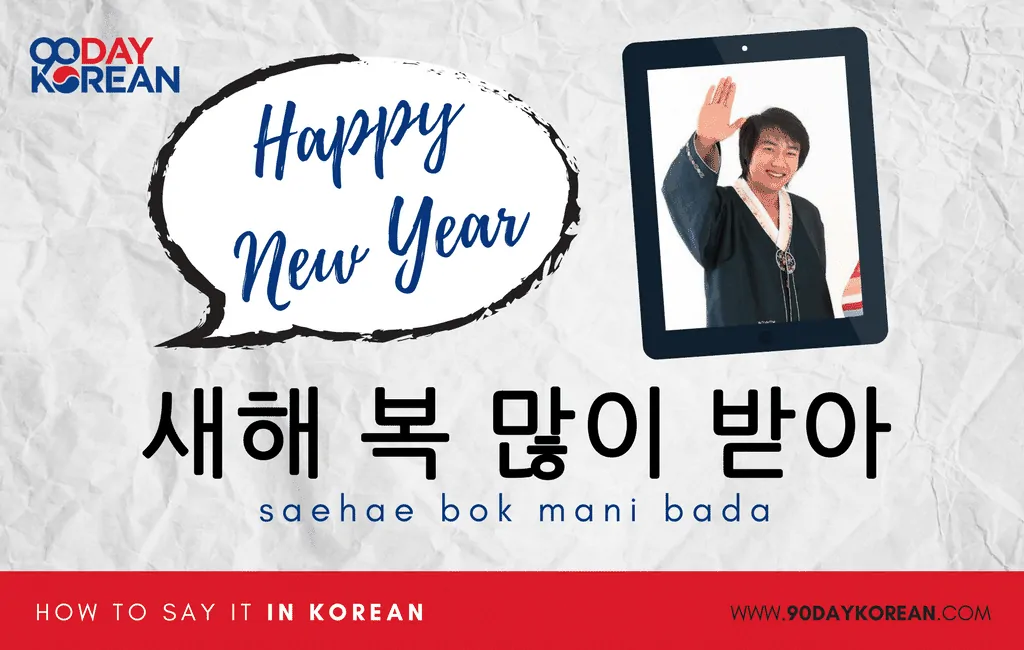Ready to try out your Korean skills while you bring in the new year? Then, you should learn how to say “Happy New Year” in Korean! We’ll show you how!
Let’s get to it and start the year right!
Contents
New Year in Korea
Before we get into the Korean vocabulary, here are a few important things to go over related to New Year’s in Korea. Firstly, Korea has two New Year celebrations.
Korean Solar New Year
On January 1st, there is the celebration of the Solar New Year, 신정 (sinjeong). That is the celebration covered in this article.
During the Solar New Year, people often spend time with their friends. In Central Seoul, on New Year’s Eve, many people gather to hear the ringing of the bell in 종로 (Jongno) on the stroke of midnight.
Korean Lunar New Year
The second New Year celebration celebrated in Korea is known as Lunar New Year or 구정 (gujeong). This is held in late January or early February. Koreans celebrate it by having a large holiday known as 설날 (seollal). During Seollal, people usually visit their hometown, eat 떡국 (tteokguk) with their families, and visit their ancestors’ graves.
How to say “Happy New Year” in Korean
There are different ways to say “Happy New Year” in Korean, depending on who you speak Korean with. We’ll explain how to use each of them below.
But before that, here’s a quick video lesson on how to say “Happy New Year” in Korean. You’ll get to learn the proper pronunciation for Korean New Year greetings, too, so make sure to listen carefully!
Formal “Happy New Year” in Korean
1. 새해 복 많이 받으십시오 (saehae bok mani badeusipsio)
This phrase is often used in formal situations, greeting cards, and when speaking to people, you want to show lots of respect. The 십시오 (sipsio) ending is the extra-formal way of saying -세요 (seyo).
Standard “Happy New Year” in Korean
Here are the standard ways of saying “Happy New Year” in Korean.
1. 새해 복 많이 받으세요 (saehae bok mani badeuseyo)
This phrase is the go-to way of saying “Happy New Year” in Korean. 새해 (saehae) is one of the words that means “new year,” 복 (bok) means “luck,” and 많이 (mani) means “many” or “lots of.” 받으세요 (badeuseyo) is the honorific way of saying 받다 (batda), meaning “to receive.”
2. 행복한 새해 되세요 (haengbokan saehae doeseyo)
This Korean expression is an alternative to 새해 복 많이 받으세요 (saehae bok mani badeuseyo) and still means “Happy New Year.” Use them both if you want to get extra practice!
Informal “Happy New Year” in Korean
1. 새해 복 많이 받아 (saehae bok mani bada)
Typically, most people wouldn’t use the informal version of this phrase. However, the informal phrase is ok to say between close friends and family.
New Year’s Resolutions
“New Year’s Resolution” in Korean is called 새해결심 (saehaegyeolsim).
The concept of making resolutions is less common in Korea than it is in other countries. However, if you want to tell people your New Year’s resolution, then you can end your sentence with -기로 했어요 (giro haesseoyo). This ending means “I plan to.” Look at the examples below to see how it is used:
Example:
살을 빼기로 했어요 (sareul ppaegiro haesseoyo)
I plan to lose weight.
한국어를 더 열심히 공부 하기로 했어요 (hangugeoreul deo yeolsimhi gongbu hagiro haesseoyo)
I plan to study Korean harder.
체육관에 더 많이 가기로 했어요 (cheyukgwane deo mani gagiro haesseoyo)
I plan to go to the gym more often.
Wrap Up
Hopefully, now you know how to say “Happy New Year” in Korean. Remember to learn the phrase 새해 복 많이 받으세요 (saehae bok mani badeuseyo) so that you can wish all of your Korean friends a happy new year!
Can’t read the Korean words in this article yet? Click here for a quick guide to learning the Korean alphabet.
If you want to learn Korean phrases, there are more great ones you can learn here! Don’t let this be the end of your study journey.







I know how to say Happy New Year to someone first, but if they say it to me first, how would I respond? In English I would say “Happy New Year to you too” but I’m unsure for Korean
Hi Sherry, you can say the same but with 도 after the person’s name or appropriate title. For example, 수진 씨도 새해 복 많이 받으세요 for “Happy New Year to you (Soojin) too.” And 할머니도 새해 복 많이 받으세요 for “Happy New Year to you (grandma) too.”
thanks alot of information goodjob
Thanks for your comment, Reyhan! ^^ If you want, you can check our blog and visit our YouTube channel for articles and videos with great Korean content.
Happy new year🙂have a fantastic year
새해 복 많이 받으세요
새해 복 많이 받으세요! Happy new year, Sheba! ^^
Many thanks. I have studied many sentences in this topic
That’s great! Great job! ^^
It is very good and happy new year 2021
새해 복 많이 받으세요! Happy new year, Gowrilakshmi! ^^
Saehae bok mani bada
Happy new year, Francesca! ^^